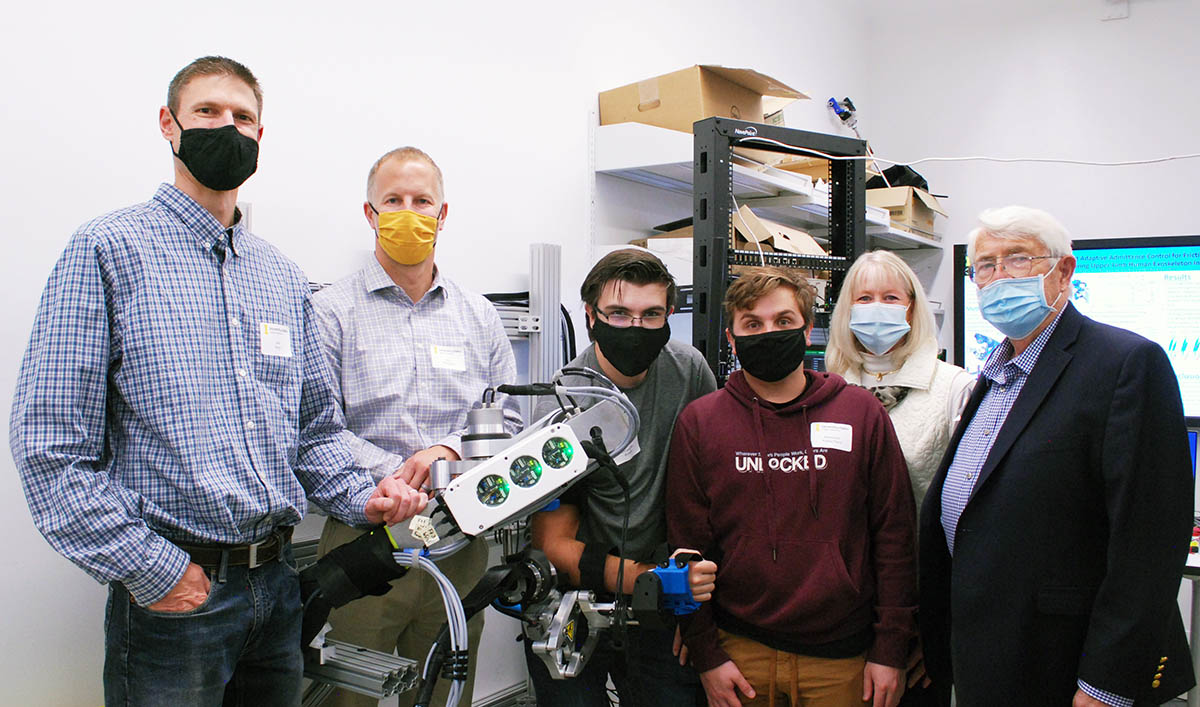Building Meaningful Careers in Robotics
University of Idaho Professorship Strengthens Robotics Research
Eric Wolbrecht was recently named the U of I Dean and Cindy Haagenson Endowed Professor. Wolbrecht’s team develops and tests complex robotic devices used to improve therapies and rehabilitative treatments for stroke survivors.
Dean and Cindy Haagenson Endowed Professorship Strengthens Robotics Research to Improve Outcomes for Stroke Patients
For Eric Wolbrecht, society’s toughest medical challenges will not be solved by students and faculty alone – solutions require the talents and commitment of alumni, medical professionals and entire communities working together.
“That is the environment we have at the University of Idaho; people work together for a common goal to achieve more than we can achieve individually,” he said. “A big part of that collaborative effort is the U of I alumni who see value in the work being done and want to work toward the same achievements.”
Wolbrecht was recently named the U of I Dean and Cindy Haagenson Endowed Professor. The endowment, created by longtime university supporters and alumni Dean ’65 and Cindy ’72, ’82, ’87 Haagenson, supports faculty impact on student success and helps future students set a course for meaningful engineering careers.
“Dean and Cindy Haagenson are proud Vandals who have a long history of giving to the university and their communities,” Wolbrecht said. “Their gift continues this legacy of collaboration, providing a consistent source of financial resources to recruit and develop undergraduate and graduate students and hire excellent faculty.”
The Haagensons have had a long-lasting impact in northern Idaho, where they were both born and raised in Bonners Ferry. Cindy’s 35-year career in special education in Coeur d’Alene and Dean’s entrepreneurial construction experience on large projects like the Kootenai Cancer Center in Coeur d’Alene, the couple saw the value and real-life applicability of Wolbrecht’s Assistive Robotics Lab on the U of I Moscow campus.

The lab, co-facilitated by Wolbrecht and Mechanical Engineering Professor Joel Perry, gives students the opportunity to explore programming and machining skills as they develop and test complex robotic devices used to improve therapies and rehabilitative treatments for stroke survivors.
“The field of rehabilitation robotics has been around for several decades now,” Wolbrecht said. “There’s been a lot of great work done, but there’s also a lot more work that needs to be done to provide the best form of care that we can to people. This is why this endowment is so important.”
Dean and Cindy Haagenson are proud Vandals who have a long history of giving to the university and their communities. Their gift continues this legacy of collaboration, providing a consistent source of financial resources to recruit and develop undergraduate and graduate students and hire excellent faculty.Eric Wolbrecht, Dean and Cindy Haagenson Mechanical Engineering Endowed Professor
The endowed professorship provides a stable and permanent revenue source for research conducted in the lab. It allows U of I to hire and retain top faculty and research assistants, Wolbrecht said, while at the same time providing the university the opportunity to align itself with industry leaders and top medical staff.
Devices developed in the Assistive Robotics Lab are designed to analyze a patient’s limb movements, identify precise areas of limited mobility, gather data and help build better rehabilitation treatments.
Three stroke patients at Providence St. Luke’s Rehabilitation Institute in Spokane are currently testing a device focused on evaluating upper arm mobility.
“An endowment of this kind is a really powerful recruiting tool to continue our development of state-of-the-art research and to enable collaborations with other researchers in the state and across the country,” Wolbrecht said. “The University of Idaho can really elevate its reputation and the quality of its research.”
Article by Alexiss Turner, Marketing and Communications Manager, College of Engineering.
Video by Will Knecht and Kara Billington, University Creative Services.
Photos by Melissa Hartley, University Creative Services.
Published in April 2022.
Eric Wolbrecht, Ph.D., P.E.
Department Chair and the Dean and Cindy Haagenson Mechanical Engineering Endowed Professor
Engineering Physics 324I
208-885-0348
Campus: Moscow
Courses: Dynamics; Dynamic Modeling of Engineering Systems; Experimental Methods for Engineers; Lean Manufacturing; Robotics: Kinematics, Dynamics, and Control; Control Systems; Applied State Estimation
Areas of Expertise: Rehabilitation Robotics, Nonlinear and Adaptive Control, Neurorehabilitation, Mechanism Design and Synthesis, Control of Pneumatic Actuators, State Estimation, Autonomous Underwater Vehicles








